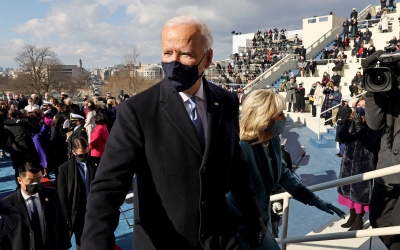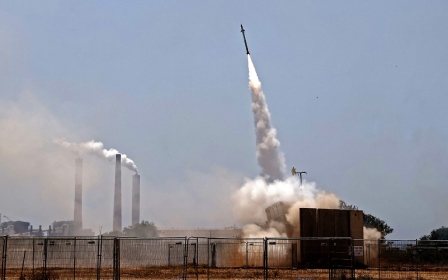US-Israel relations: Biden must stand up to Bennett on Palestinian rights

US President Joe Biden is scheduled to meet with the new Israeli prime minister, Naftali Bennett, at the White House on Thursday, in the first face-to-face meeting between the two men in their respective positions.
Although Bennett is expected to try to smooth over the ruffled feathers between Israel and the Democratic Party created by his cantankerous and highly partisan predecessor, Benjamin Netanyahu - who famously undercut President Barack Obama’s foreign policy agenda and virtually openly campaigned against him in the 2012 elections - it would be a mistake for the Biden administration to conduct US-Israeli-Palestinian relations through the prism of personal relations between the president and new prime minister.
The Biden administration cannot continue to countenance Israel’s seemingly permanent colonisation of the West Bank and its illegal 15-year blockade of the Gaza Strip
While Bennett may indeed succeed in tamping down some of the personal rancour between US and Israeli leaders that characterised the Obama era, it’s important to note that his diehard opposition to Palestinian self-determination is perhaps even more extreme than Netanyahu’s.
In other words, a change in the guard in Israeli leadership in no way bridges the Obama-era chasm between nominal US support for Palestinian statehood and Israel’s implacable opposition to it, a policy divergence only temporarily papered over by the Trump administration’s embrace of Israeli colonisation and annexation.
But simply returning to business as usual is not an option.
New MEE newsletter: Jerusalem Dispatch
Sign up to get the latest insights and analysis on Israel-Palestine, alongside Turkey Unpacked and other MEE newsletters
The Biden administration cannot continue to countenance Israel’s seemingly permanent and irreversible colonisation of the West Bank and its illegal 15-year blockade of the Gaza Strip, which collectively punishes two million Palestinians under the pretext of Hamas’s actions.
Nor can the US carry on supporting Israel's propping up of an increasingly authoritarian Palestinian Authority led by octogenarian Mahmoud Abbas, who is currently 16 years into a four-year term and is resorting to deploying his US-trained security forces to repress dissent through mass arrests of activists and killings.
Defunct two-state solution
The demise of the so-called two-state solution - let’s be honest, even if that was ever a sincere and realistic option, the window of opportunity has long since been hermetically sealed shut - necessitates a complete overhaul of the US approach towards Israeli-Palestinian issues.
From an outmoded conflict resolution perspective or, more accurately, a conflict management perspective, the US will be forced by the inexorable logic of Israeli colonisation to eventually get behind a decolonisation paradigm.
This transformation, no doubt, will be wrenching and long-term, as US decision-makers come to realise that the two-state paradigm is defunct. And even though Biden won’t be making any nods in this direction during his meeting with Bennett and will prefer platitudes about supporting Palestinian statehood, there are nevertheless short-term agenda items that Biden should raise with Bennett to at least mitigate the harmful impacts on Palestinians of Israel’s current regime of settler-colonial violence.
First, Biden must make it unequivocally and publicly clear to Israel that the US will not allow additional acts of ethnic cleansing against Palestinians in East Jerusalem, part of the occupied West Bank illegally annexed by Israel.
Currently, more than 1,000 Palestinians are at risk of forced displacement in the Jerusalem neighbourhoods of Sheikh Jarrah and Silwan. In the former, Israeli settlers are trying to displace long-time Palestinian residents; in the latter, Israel plans to demolish Palestinian homes to build a biblical theme park.
Israel’s ethnic cleansing plans in Jerusalem should be of even greater concern to the Biden administration because of the near-certainty that Israel will utilise US equipment, provided at taxpayer expense, to conduct and enforce this dispossession.
The Biden administration has yet to publicly respond to an inquiry from members of Congress about its plans to prevent these atrocities from occurring. Bennett’s visit is the opportune moment to do so.
Second, and related to the above demand, the Biden administration must pressure Israel to end its racist and discriminatory land-use policies which make it almost impossible for Palestinians to secure from Israeli authorities the permits needed to build homes. Instead, Palestinians are often forced to build without permits, providing Israel with the pretext to demolish them.
Third, the latest round of fighting between Israel and Hamas in May drew renewed attention to Israel’s illegal blockade of the Gaza Strip. Recently, more than 50 members of Congress called on the State Department to press Israel to ease humanitarian access to the Gaza Strip and enable Palestinian fishermen to go further out to sea than the Israeli navy currently permits.
While these steps might slightly ease the devastating impact of Israel’s blockade, it is no substitute for ending Israel’s siege on Gaza, a step that is long overdue and which the United States should support.
Complicity and bias
Fourth, the Biden administration should not approve the transfer of additional weapons to Israel before investigating whether it violated US laws in its recent attack on the Gaza Strip.
Fragments of a Boeing Joint Direct Attack Munition (JDAM) were found in the rubble of Israel’s single deadliest strike, which killed 43 Palestinians, including 22 members of the Kawlak family. Israel’s killing of Palestinian civilians with weapons paid for by US taxpayers make Americans complicit in its atrocities, and this must end.
There is nothing moral in supporting a settler-colonial regime
Shamefully, instead of investigating this outrage, the Biden administration rushed forward additional shipments of JDAMs to Israel over congressional objections. Holding Israel accountable to US laws is a domestic matter, but the president should take the opportunity of his meeting with Bennett to insist that US weapons are not used to oppress Palestinians.
President Biden entered office promising to restore America’s moral authority and honour human rights. He repeatedly asserts that America is back. Biden has to choose whether the US under his leadership is back to complicity and bias in favour of Israel against the aspirations and legitimate rights of the Palestinians, or whether he will chart a moral and a practical path.
There is nothing moral in supporting a settler-colonial regime.
The views expressed in this article belong to the author and do not necessarily reflect the editorial policy of Middle East Eye.
Middle East Eye delivers independent and unrivalled coverage and analysis of the Middle East, North Africa and beyond. To learn more about republishing this content and the associated fees, please fill out this form. More about MEE can be found here.







